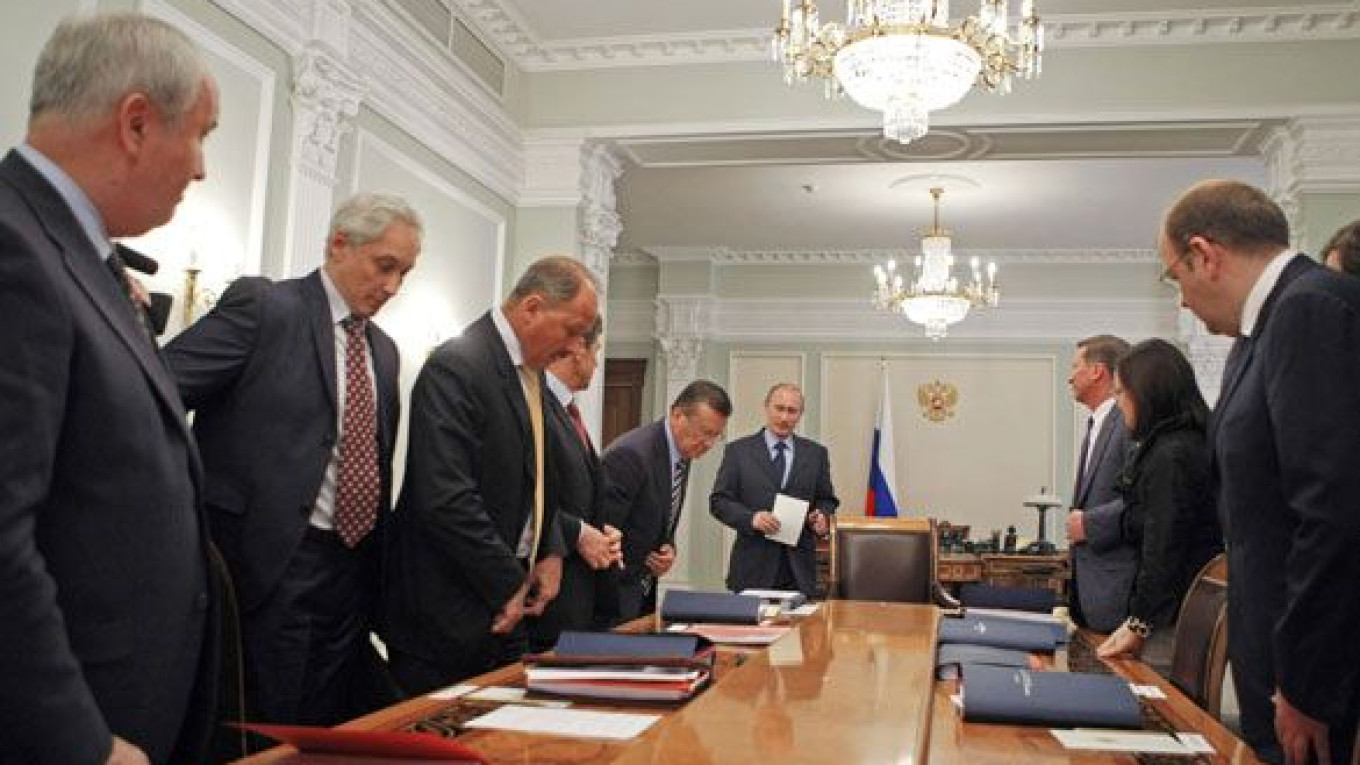NOVO-OGARYOVO, Moscow Region — Russia's biggest shipping company, state-owned Sovkomflot, has agreed to carry oil to China across the Arctic Ocean, an unusual route for such cargo, a senior government banker said Wednesday.
Vladimir Dmitriyev, chief of the state development bank VEB, made the statement after the lender's board, chaired by Prime Minister Vladimir Putin, convened earlier in the day to approve a 240 million euro ($293 million) purchase of two ice-breaking tankers from a St. Petersburg shipyard for subsequent leasing to the shipping company.
Sovkomflot ordered the vessels to take oil from Gazprom's offshore Prirazlomnoye field in the Arctic, whose development has fallen much behind schedule. Gazprom is now planning to send a drilling rig to the field next year.
The delay prompted Sovkomflot to line up a contract to use the Finnish-designed tankers for oil supplies from the Arctic port of Murmansk to China, Dmitriyev said.
"The ships are meant for work in icy conditions," he told reporters at Putin's residence of Novo-Ogaryovo, adding that they could carry oil, oil products and gas condensate to Southeast Asia as well.
Sovkomflot has taken delivery of one of the tankers. The Admiralty Shipyard will complete the other vessel later this year, Dmitriyev said.
He referred further questions from The Moscow Times to Sovkomflot.
A receptionist at Sovkomflot said she could not put a spokesman on the line when called for comment after normal working hours. Sovkomflot deputy chief Yevgeny Ambrosov said at a conference in Murmansk in October that the company would send east-bound oil shipments along Russia's northern coast in 2010.
Compared with other sea routes, an Arctic line would pose greater risk to the ships' crews and the region's largely pristine environment because of the lack of sufficient search-and-rescue and disaster-relief facilities in the area.
Even as global warming makes the Arctic ice cover thinner, the tankers will likely be able to navigate the harsh waters only during the warmest months of the year, said Alexei Kokin, an oil analyst at investment company Metropol. The longer western route from Murmansk to China would make crude deliveries prohibitively expensive, he said.
"It's an exotic plan," he said of sea-borne supplies to China, adding that it would likely only suit minor fields close to the Arctic shore.
Russia's second-largest gas producer, Novatek, could be interested in sending its Siberian gas condensate through the polar line, Kokin said. The fuel, which trades at a large premium to oil, now travels by tankers that take it around the Cape of Good Hope, making an extremely long trip. ?
A call to Novatek went unanswered Wednesday evening.
VEB's board also agreed to lend 250 million euros to a project to build a timber processing plant in the far eastern port of Vanino, Dmitriyev said.
The bank earned 31 billion rubles ($995 million) in net income last year, which made it Russia's most profitable bank, he said.
A Message from The Moscow Times:
Dear readers,
We are facing unprecedented challenges. Russia's Prosecutor General's Office has designated The Moscow Times as an "undesirable" organization, criminalizing our work and putting our staff at risk of prosecution. This follows our earlier unjust labeling as a "foreign agent."
These actions are direct attempts to silence independent journalism in Russia. The authorities claim our work "discredits the decisions of the Russian leadership." We see things differently: we strive to provide accurate, unbiased reporting on Russia.
We, the journalists of The Moscow Times, refuse to be silenced. But to continue our work, we need your help.
Your support, no matter how small, makes a world of difference. If you can, please support us monthly starting from just $2. It's quick to set up, and every contribution makes a significant impact.
By supporting The Moscow Times, you're defending open, independent journalism in the face of repression. Thank you for standing with us.
Remind me later.


